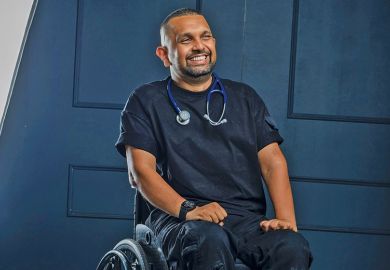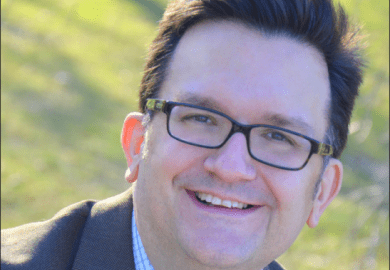Hamish Coates is executive dean at the Holmes Institute in Australia. He was previously a tenured professor at Tsinghua University’s Institute of Education, where he directed the higher education research division. His work focuses on improving standards in higher education, including guiding institutions to improve their productivity.
Where were you born?
Carlton, an inner-city suburb of Melbourne.
How has this shaped who you are?
Carlton is an eclectic suburb with traces left by Italian, Jewish and Irish diasporas. It has universities, hospitals, schools, large residences, public housing, Australia’s first parliament, painted slums, business, restaurants and gardens. Growing up hanging around such places made me reflect on different parts of the world and the cracks in between.
What are you currently researching?
How to incorporate authentic humanity, integrity and creativity into large-scale higher education.
And what have you found so far?
Education is about people. Technology by itself is not a panacea and, without smart academic leadership, can sow more problems than it solves. Education improvement needs transformation of people, institutions and policies. The intersection of contemporary artificial intelligence, global cyber-criminals and student assessment is a hot research frontier – it’s stirring a rethinking of tactics for ensuring the authenticity of assessment response.
What are the best and worst things about your job?
The best is delivering new creative ways of doing higher education. The worst is that ideas move much faster than institutions.
You’ve worked in numerous countries – which position or project was most significant in shaping your career path?
Being international project director of the Organisation for Economic Cooperation and Development’s Assessment of Higher Education Learning Outcomes (Ahelo) feasibility study, which also propelled global work on student engagement surveys. This project was so significant because it revealed the power and limits of innovative policy discourse in shaping higher education thinking and practice. It provided a three-year forum for many thousands of committed people around the world to tackle a shared problem – the (still existing!) shortage of trusted independent information about student learning outcomes in higher education. The project propelled my career path as I had the opportunity to lead a consortium of international experts to roll big experimental dice to cultivate a new field as part of a global feasibility study.
What made you transition from working at an Australian university to a Chinese one and how did you find the move?
I have tended to advance roles every five to eight years, and international research engagement fostered close friendships with scholars at the Tsinghua University Institute of Education. Shifting always involves heaps of transactions, which are tedious in themselves, but given the unique nature of my role at Tsinghua, we turned my shift into a form of applied research. It became clear that incorporating an Australian into the elite end of the Chinese system sparked many unique insights and opportunities. We gleaned insights on areas as diverse as faculty HR and health systems, advising graduate students, the role of family and community in academic life, the dearth of research on Asian higher education and next-generation global higher education networks.
And how about the subsequent return?
People, institutions, systems and governments vary around the world, and cultural patterns become evident when you shift between settings. Australia and China are both very entrepreneurial with education, though each country has a different ethos.
Your book, A Turning Point for Chinese Higher Education, focused on Tsinghua’s pivot to hybrid education during the pandemic. What is the key point you would like readers to take away from this?
Large universities can indeed change at eye-blink speed when lots of smart people contribute to make a shared vision happen.
What in your findings about the university’s pivot surprised you most?
The basic premise of most education, connecting teachers and students, endures even and especially when the world and institutions are in flux.
Do you believe that the public’s understanding of the value of higher education is changing?
Yes, universities around the world are searching for new deals, often with new communities. Universities have been hugely successful in using research prestige to sell qualifications and derivative benefits, especially to foreign students. Refreshing the licence and value proposition requires telling new stories, making new products, providing new insights and making education experiences relevant.
What has changed most in global higher education in the last five to 10 years?
Digital platforms are part of the woodwork, yet we still have the same problems with student engagement and outcomes. There remains a dire need for multifaceted information that can be actioned by institutions and stakeholders regarding student engagement, student learning and graduate outcomes. This is a 30-year-old problem and, while there have been advances, they are patchy and not yet fully incorporated into normal practice. Meanwhile, in recent years, higher education has grown in socio-economic significance, which is sparking the need for new information on social engagement, sustainability, impact and inclusiveness. Finding sensible ways to harness the huge volumes of information in and around higher education in ways that improve policy and practice is an important contemporary challenge.
Has increased global scrutiny on academic collaboration with China affected your research?
Not directly, because I am not a “China scholar” per se – most of my research focuses on global or regional policies, institutions, strategies and governance, and so on. China is a major part of higher education. China keeps changing, universities play an important role in Chinese society and it is profoundly important for the global good that collaborations are sustainable and flourish.
What keeps you awake at night?
Loud cars.
Do you live by any motto or philosophy?
I love trees and dislike traffic lights.
What do you do for fun?
Grow plants, cook food and go wandering, especially up big mountains.
helen.packer@timeshighereducation.com
CV
1999-2002 Research assistant, University of Melbourne
2002-03 Statistics tutor, Melbourne
2002-04 Research fellow, Melbourne
2005-06 Senior research officer, Graduate Careers Australia
2006-13 Research director, higher education, Australian Council for Educational Research
2010-13 Programme director, LH Martin Institute for Tertiary Leadership and Management, Melbourne
2013-17 Continuing professor, Melbourne
2017-22 Tenured professor, Tsinghua University
2022-present Executive dean, Holmes Institute
Appointments
George Williams has been named vice-chancellor of Western Sydney University, replacing Barney Glover, who completed his term in April. A constitutional law expert, Professor Williams is currently deputy vice-chancellor for transformation, planning and assurance at UNSW Sydney, having previously served as dean of UNSW Law. He said there was “no university or region in Australia with greater potential” than Western Sydney and that it was an institution “essential to the nation’s economic and social growth”.
Elizabeth Chilton will be the next president of the University of New Hampshire. Currently chancellor of Washington State University’s Pullman campus, she replaces James Dean, who is retiring in June. Professor Chilton previously served as provost and executive vice-president of the WSU System and, prior to this, was the dean of the Harpur College of Arts and Sciences at Binghamton University. She said she had “long admired UNH’s history, vibrant and engaged community, and commitment to student success and scholarship”.
Joe Yates will be the next vice-chancellor of Wrexham University, moving from his current position as pro vice-chancellor for place and partnership at Liverpool John Moores University.
Rachel Thomson has been promoted to provost and deputy vice-chancellor at Loughborough University. She is currently pro vice-chancellor for education and student experience.
Dorota Grejner-Brzezinska, currently vice-president for knowledge enterprise at The Ohio State University, will become the next vice-chancellor for research at the University of Wisconsin-Madison in September.
Brooke Storer-Church is joining UK representative organisation GuildHE as its new chief executive, replacing Gordon McKenzie, who is retiring. She was most recently director of strategic academic engagement at Birmingham City University.
Corinna Fletcher has been appointed as Aston University’s new chief people officer. She joins from Group Lotus where she was the group organisational development director.
Register to continue
Why register?
- Registration is free and only takes a moment
- Once registered, you can read 3 articles a month
- Sign up for our newsletter
Subscribe
Or subscribe for unlimited access to:
- Unlimited access to news, views, insights & reviews
- Digital editions
- Digital access to THE’s university and college rankings analysis
Already registered or a current subscriber?





